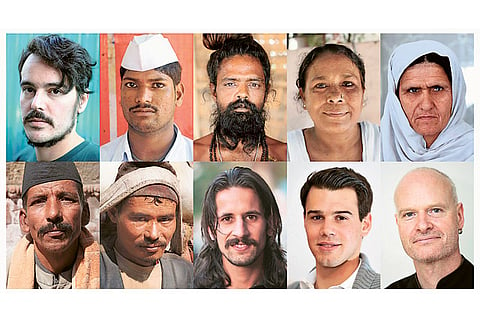Symbolic milestone and real challenges
World population crosses 7b today threatening our future

Dubai: In the blink of an eye sometime today, the world's population will turn seven billion.
Every second, at least two babies are born throughout the world — and the United Nations estimates the milestone will be passed today. But the reality is that no one knows for sure, and the event is largely symbolic.
What isn't symbolic, however, are the social, economic, heath and environmental issues pressing on the seven billion of us who squeeze together on the planet.
"This is not a story about numbers. This is a story about people," UN leader Ban Ki-moon said at a New York school last week.
"Seven billion people who need enough food. Enough energy. Good opportunities in life for jobs and education. Rights and freedoms. The freedom to speak. The freedom to raise their own children in peace and security.
"Everything you want for yourself — seven billion times over," he told students.
An extra billion people have been added to the world's population since just after midnight on October 12, 1999, when the United Nations named a Bosnian baby, Adnan Mevic, as the Earth's six billionth inhabitant.
The secretary-general at the time, Kofi Annan, was pictured in a Sarajevo hospital with Mevic in his arms.
The Mevic family is now struggling in poverty at their Sarajevo home, which is partly why no baby will be put in the global spotlight this time.
Double burden
In Western Europe, Japan and Russia, today's birth will be an ironic milestone amid worries about low birthrates and ageing populations. In China and India, the two most populous nations, it's an occasion to reassess policies that have already slowed once-rapid growth.
But in Burundi, Uganda and the rest of sub-Saharan Africa, the demographic news is mostly sobering as the region staggers under the double burden of the world's highest birthrates and deepest poverty. The regional population of nearly 900 million could reach two billion in 40 years at current rates, accounting for about half of the projected global population growth over that span.
Experts say most of Africa — and other high-growth developing nations such as Afghanistan and Pakistan — will be hard-pressed to provide enough food, water and jobs for their people, especially without major new family-planning initiatives.
"Extreme poverty and large families tend to reinforce each other," says Lester Brown, the environmental analyst who heads the Earth Policy Institute in Washington. "The challenge is to intervene in that cycle and accelerate the shift to smaller families."
Political destabilisation
Without such intervention, Brown says, food and water shortages could fuel political destabilisation in developing regions.
"There's quite a bit of land that could produce food if we had the water to go with it," he said. "It's water that's becoming the real constraint."
According to demographers, the world's population didn't reach one billion until 1804, and it took 123 years to hit the two-billion mark in 1927. Then the pace accelerated — three billion in 1959, four billion in 1974, five billion in 1987 and six billion in 1998.
Looking ahead, the UN projects that the world population will reach eight billion by 2025, 10 billion by 2083. But the numbers could be much higher or lower, depending on such factors as access to birth control, infant mortality rates and average life expectancy — which has risen from 48 years in 1950 to 69 years today. The executive director of the UN Population Fund, former Nigerian health minister Babatunde Osotimehin, describes the seven billion milestone as a call to action — especially in the realm of enabling adolescent girls to stay in school and empowering women to control the number of children they have.
Sign up for the Daily Briefing
Get the latest news and updates straight to your inbox



